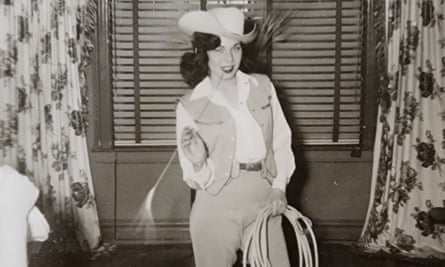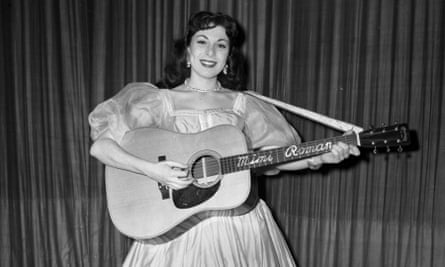‘O
Mimi Roman, at her Connecticut home, is going through her mail and expresses relief that she did not receive a photo of herself with Elvis to sign. She receives multiple fan letters each week, all requesting her autograph on that particular photo. Mimi dislikes the photo, including her outfit and bag, and wishes there was another option available.
Although her friendship with Elvis before he became famous is often mentioned in her biography, Roman also has her own place in history as one of the first successful female artists in country music. She was also a key figure in the early years of rock and pop, witnessing the emergence of rock’n’roll, rockabilly, and the “Nashville sound” in country music. She graced the stages of iconic venues like the Grand Ole Opry and recorded demos for famous songwriters in New York City’s Brill Building during its golden era. However, in the mid-80s, she decided to leave the music industry to focus on her family and pursued a career as a real estate agent. Eventually, she became an assistant to musician Michael Bolton.
During the lockdown, Roman was contacted by documentarian Joe Hopkins while in the kitchen, leading to the creation of the film Brooklyn Cowgirl: The Mimi Roman Story. The film was released last year and led to an opportunity for Roman to perform at the Swelltune Records Bay State Barn Dance in Beverly, Massachusetts this year. In September, at the age of 89, she performed for the first time in 40 years. Roman has a positive attitude and believes in taking advantage of opportunities that come her way.
In her living room, we find the guitar that has been a constant companion throughout her career, resting in its case with her name beautifully inscribed on the fretboard. Miriam Lapolito, who was later known as Mimi Rothman after her mother’s remarriage and move to Brooklyn, was born in 1934 to a Radio City Music Hall rockette and a bookmaker from the Bronx. Growing up in the 1940s, Brooklyn offered vast open spaces, stables, and bridle paths, and Mimi became a member of a group of horse enthusiasts known as the Brooklyn Cowboys. She quickly became a skilled and award-winning rider. When the annual rodeo came to Madison Square Garden, Mimi Rothman competed as Mimi Rohman, using a different last name to conceal her Jewish identity from one of the judges who was known to be prejudiced against Jewish people. Despite this challenge, Mimi was crowned rodeo queen.

At the age of 16, she developed a passion for country music after a friend introduced her to Jimmie Rodgers’ “Waiting for a Train.” She was drawn to the simplicity and storytelling of the song, and it sparked her love for the genre. She would spend her nights trying to tune into radio stations from different states like West Virginia, Washington, and Texas just to hear more country music. She began singing and even appeared on television talent shows. During her time in Tennessee, she met the Everly Brothers, who were not yet famous. Despite her attempts to convince them to add a female singer to their act, they became friends. When they visited New York, Roman joined them as their companion. She remembers them as two very different personalities – Phil was silly and humorous while Don was serious. She became close with the more lighthearted brother.
Roman was quickly asked to appear on the Midwestern Hayride TV show in Cincinnati and also hosted a 15-minute radio program with the Willis Brothers, a country group that had not yet achieved fame. Mimi finds it amusing that she had to sing a hymn at the end of each show. As a Jewish singer from Brooklyn, she did not know many hymns, but she learned them while on the job.
Roman signed a contract with Decca and her producer, Owen Bradley, who was instrumental in creating the Nashville sound, played piano on her initial recordings. These recordings were made at the Ryman auditorium, which was the venue for the Grand Ole Opry radio show. “This experience had a profound impact on me compared to any other shows I had done,” says Roman. “I had been listening to the Opry on the radio for years and was familiar with all the artists who had performed on that stage, like Hank Williams. It held significant meaning for me.” She would soon have the opportunity to perform on the same stage for WSMU’s radio broadcast.
During the emergence of the Nashville sound, which replaced the rough honky tonk style with smoother and more accessible productions featuring melodious singing, piano, and often backup singers and strings, Roman stood out as one of the few female artists to make a breakthrough. According to singer-songwriter Laura Cantrell, who first discovered Roman while hosting a country music radio show in the early 90s, Nashville at the time held stereotypes that young women were not capable of selling records or tickets. With the likes of Loretta Lynn and Patsy Cline still in the early stages of their careers, there were limited examples of successful women in country music. Roman bridged the gap between the honky tonk era and the rise of rock’n’roll, which would ultimately change the landscape of Nashville and lead to the development of another commercially viable sound. As Cantrell puts it, Roman was present at a pivotal moment in the industry’s evolution.

Mimi Roman, originally from Salinas, California, was signed to Decca record label and later rebranded as Mimi Roman. She was given the opportunity to support Johnny Cash and perform at the annual celebration of country musician Jimmie Rodgers, where she entertained a crowd of 100,000 people. During the 1955 country music disc jockey convention in Nashville, Elvis was named as the most promising male star. Roman recalls that she was not familiar with Elvis at the time, but he recognized her. She tried to avoid him, but he persisted in following her. Eventually, their friendship grew when Elvis and his manager Colonel Tom Parker visited New York. Roman remembers being struck by his good looks and undeniable charisma, stating that some people are just destined for fame.
We often went out to eat and went to the cinema. According to Roman, one of the movies we watched together was Helen of Troy. When I saw Elvis, I couldn’t help but notice that he was even more handsome than the actor on the screen. His profile was like that of a Roman coin, very impressive. He still had a youthful face and was incredibly good-looking, and he was just a genuinely nice guy. He made sure to call his mother every day.
According to Walter Winchell, a prominent gossip columnist and radio host in the United States, there were rumors of an affair between Roman and Elvis when they were both 19 years old. However, Roman denies any romantic involvement and describes Elvis as a young man who found the attention surrounding him amusing but didn’t fully understand it. When Roman accompanied Elvis to the airport after The Ed Sullivan Show, she realized it might be the last time she would see him. Later, when she visited Memphis and tried to contact Elvis, she discovered that he had already moved to California and changed his phone number.
She found it challenging to reconcile the image of Elvis in his jumpsuit with the handsome teenager she once knew. She recalls feeling a deep sense of sadness when he passed away. As a young girl, she would accompany him wherever he wanted, but later realized that he was trapped in a certain image. This realization made her uninterested in pursuing fame. The Elvis she knew had transformed into a bloated caricature, which was devastating for her to witness. Roman had rejected Parker’s attempts to become her manager, citing her distrust for him. She shares that she had a gut feeling about him being deceitful and manipulative, which was evident to her as a New Yorker.
Ignore the advertisement for the newsletter.
after newsletter promotion
However, Roman also experienced her own taste of fame in 1956. According to her, “Patsy Cline and I were both recording during the same weekend.” They had the same producer, Owen Bradley, who jokingly labeled Cline as “a country singer who wanted to sing pop” and Roman as “a pop singer who wanted to sing country.” As they divided songs between them, Cline ended up with “Walking After Midnight,” which went on to become a million-selling single and is widely considered one of the best country songs of all time. On the other hand, Roman’s songs – “Honky Tonk Girl” and “We’re Taking Chances” – did not make it onto the charts. However, she has no regrets or thoughts of what could have been. As she puts it, “That was her destiny,” referring to Cline’s success, “and mine was to be wherever I was. I never dwelled on it. Everything comes with a price.” If “Walking After Midnight” had been her song, she believes she would have been on the plane that ultimately crashed and took Cline’s life.
During the 1950s, there was a rise in package tours. In 1957, Roman became part of the Philip Morris Agency’s touring show, which featured some of the most popular and well-known stars in the country, such as Carl Smith, Goldie Hill, and briefly Little Jimmie Dickens. The initial plan was for the tour to last 13 weeks, but it was so successful that it ended up lasting for 18 months. Roman was often the only woman on a bus filled with men. She made it clear from the beginning that there would be no tolerance for Jewish jokes. The job was physically demanding, as they traveled around the southern states in a bus without a bathroom or air conditioning. “We went through two buses!” recalls Roman.
During the tour, a solution was found to circumvent segregation laws. Roman explains that although the law prohibited seating Blacks and whites together, it did not forbid them from standing together. However, this arrangement was met with disapproval in New Bern, North Carolina. The Ku Klux Klan made their presence known by driving back and forth in front of the building where the show was taking place. Despite the tense atmosphere, the show continued without any breaks. Afterward, the Klan and police escorted the bus out of New Bern for safety reasons. Roman recalls feeling scared, especially with a Jewish person on board and the bus driver armed with a gun. This experience ultimately led to Roman’s decision to leave show business.
Roman’s touring days came to an end, which she describes as the tipping point for her. She returned to her hometown of New York and in the early 1960s, she had a daughter with songwriter Paul Evans. For the next ten years, she worked as a demo singer at Associated Recording Studios and 1650 Broadway, a popular hit-making factory. Artists such as Burt Bacharach, Goffin and King, Lieber and Stroller, Doc Pomus, and Neil Sedaka would come into the studio, sit at the piano, and hand her a sheet of lyrics. Sometimes she would also sing demos with Paul Simon. Roman’s memories of this time are a blur, as she recorded demos, commercials, and scratch recordings for musicals like Funny Girl and Chicago. She claims to have sung for almost every writer in her neighborhood. Occasionally, if a publisher was impressed with Roman’s demo, they would release it as a single. She even took on a pop alter ego named Kitty Ford, and her rendition of “Don’t Play Number 9” by Mann and Weill was covered by Ricky Valance.
After Roman got remarried and moved to Connecticut, she stopped singing in order to focus on raising her step-children. Following her divorce, she worked as a disc jockey in Bridgeport and performed with a local country band on weekends. However, when she got married again in the mid-80s, she decided to leave music behind and pursue a career as an estate agent. Reflecting on her past experiences, Roman shares, “Singing was a wonderful part of my life, but it no longer fit into my circumstances at that point.” She has no regrets about not pursuing fame, stating, “I never had a desire to be a household name. I wasn’t willing to pay the price for that level of stardom.” Roman’s musical days were over. “I was married for 25 years and my husband never heard me sing.” Even her employer, Michael Bolton, was unaware of her musical background when he hired her as his personal assistant after purchasing a house from her in the late 1980s. “I never brought it up,” says Roman.
Following Roman’s comeback in September, Cantrell has extended an invitation for her to join her band in December for the Brooklyn show of her States of Country concert series. Cantrell shares, “I was drawn to her as a fellow female musician who creates music for the love of it. Her energy and storytelling abilities really stood out to me.”
Roman is pleased to have her accomplishments recognized, even if it was during a time when women were not typically acknowledged. She jokes, “I’m happy to receive recognition, even if it was back in the 1950s.” She also adds, “I’m grateful to still be here to receive this recognition.”
Source: theguardian.com


